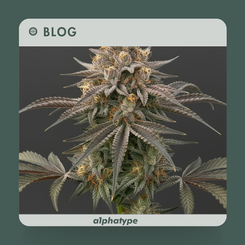News: Colombia’s Diverse Environments Grow Marijuana With ‘Uncommon Terpenes’ That Can Have ‘Unique Therapeutic Benefits,’ Study Shows.
- Manuel Basegla
- Sep 9, 2024
- 2 min read
Updated: Feb 28, 2025
Published 12:02 AM EST, Tues September 10, 2024
New research on Colombian-grown cannabis reveals “significant phytochemical diversity” in the plants, uncovering what authors say are “four distinct chemotypes based on cannabinoid profile” as well as plants that are rich in uncommon terpenes.

New research on Colombian-grown cannabis reveals significant phytochemical diversity, identifying four distinct chemotypes based on cannabinoid profiles: THC-dominant (Type I), CBD-dominant (Type III), CBG-dominant (Type IV), and balanced (Type II). The study highlights Colombia's unique environmental conditions—ranging from rainforests to volcanoes—which contribute to the rich diversity of cannabinoids and terpenes found in the plants. This diversity has the potential to enhance resistance to pests and pathogens, benefiting cultivators, while also opening new avenues for the development of unique medical marijuana products.
The research analyzed 156 samples from 17 licensed cultivation sites across Colombia, revealing a wide variety of phenotypes in terms of structure, color, and chemical composition. Regional trends were observed, with higher THC-A concentrations found in the South Central and Amazon regions and the highest CBD-A levels detected in the Coffee Triangle. In addition, certain minor cannabinoids, such as CBDV and THCV, were more abundant in specific regions, further showcasing how environmental factors influence the chemical profiles of cannabis plants in Colombia.
Terpene analysis across the samples demonstrated that THC-dominant Type I varieties had the greatest terpene diversity, with compounds like β-myrcene and nerolidol prominent in different chemotypes. The presence of uncommon terpenes suggests that Colombian cannabis may offer unique advantages in medicinal chemistry applications and pest resistance. These findings underscore the potential for Colombia to contribute to global cannabis production by offering chemically distinct and therapeutically beneficial cannabis varieties.
The study emphasizes the need for further research, including whole-genome sequencing and comparisons of genetic pools across different regions, to better understand how Colombia's diverse environments shape cannabis biochemistry. As more regions legalize cannabis, the genetic diversity observed in Colombian cannabis could play a key role in advancing both recreational and medicinal markets, reinforcing the country’s potential to become a leader in the global cannabis industry.
Source: Marijuana Moment
























































